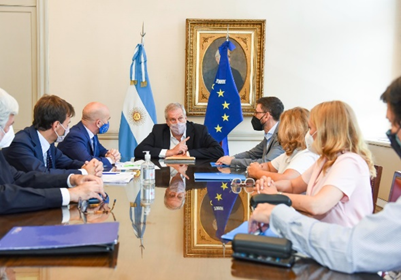The Ministry of Education of Argentina and the Social Policies area of EUROsociAL+ are working on obstacles preventing young people and adolescents at the secondary level in densely populated cities from returning to the classroom, among other educational issues.

From 21 to 24 February, EUROsociAL+ expert Pepe Menéndez worked with national, provincial and local authorities on a mission to Argentina to validate proposals to include, readmit and keep adolescents in secondary school, drawn up in collaboration with the Undersecretary of Social Education of the Ministry.
Minister of Education Jaime Perczyk, Secretary of Education Silvina Gvirtz, Secretary of Educational Cooperation Andrea García and the Undersecretaries of Educational Management and Social Education Mauro Di María and Alejandro Garay took part in the inauguration of the mission. EU ambassador Amador Sánchez Rico, head of Cooperation Luca Pierantoni, expert Pepe Menéndez and Virginia Tedeschi, from the Social Policies area of EUROsociAL+ were there to represent the European Union.
The education minister stressed that getting young people back into school is a government priority and that the Federal Education Council has resolved to return to in-person classes in all jurisdictions during the 2022 school year, as well as the one-to-one re-linking with the BACK TO SCHOOL plan.
As a result of the support provided by Pepe Menéndez, the proposals presented during the week have been submitted to the national and provincial authorities for validation. The mission visited the districts of Villa Itatí and Villa Azul (Quilmes) and the UNSAM Technical Secondary School (San Martín) to discuss the proposals with teachers, students and managers.
The activity is the last of a series of meetings that started mid-2021 with key actors, that included an International Dialogue Workshop on 29 November 2021, in collaboration with specialists from Argentina, Spain, Portugal and Uruguay. Among the participants were: Begonya Gasch, director of theEl Llindar Foundation (Catalonia), Boris Mir, Susanna Soler, director Institut Montgros(Barcelona), Sergio del Moral, Institut Les Vinyes (Barcelona), Jordi Plana, manager of the Barcelona Provincial Council (until 2021), Mar Camacho, Ministry of Education of the Generalitat de Catalunya (2018-2021), Ana Gil, Municipality of Cascais (Portugal), Rafael Ruiz de Gauna, Pere Tarres Foundation (Catalonia) and Ana Verocai, ANEP (Uruguay).
The EUROsociAL+ European Union Programme initiative with the Ministry of Education consists of supporting the creation of intervention models in three priority areas: (i) inclusion, re-entry and keeping adolescents in school (Catalan expert Pepe Menéndez ), (ii) access, permanence and graduation from the educational system of children and adolescents with different types of disabilities ( ONCE social group ) and (iii) keeping indigenous girls and adolescents in school (expert Rosa Guadalupe Mendoza Zuany).
Further exchanges are planned to share experiences in Costa Rica, Colombia, Spain, Portugal and Uruguay for area (ii) and with Mexico and Guatemala for area (iii). A seminar for high authorities of Mercosur on these issues is planned, before presenting the proposals to the Federal Council of Education.
The findings and suggestions stemming from this technical support will be summarised in a unanimous request by the key actors involved to deeply transform the secondary school system so that it responds to the reality of belonging and encourages young people to get the education they need for the future, based on four strong ideas:
1) Emphasising that schools have a central role in promoting significant experiences in the student body;
2) Support schooling while covering people’s basic needs.
3) Upholding digital inclusion as a right of citizenship, it being the State’s responsibility to make it available to all.
4) Coordinate and simplify the network of public institutions involved in education.



